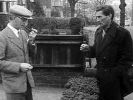Eye For Film >> Movies >> Refuge England (1959) Film Review
Refuge England
Reviewed by: Rebecca Naughten

One of the few names from the Free Cinema movement to stick with documentaries (he later joined the BBC and made a series of renowned films for them before his premature death in 1974), Robert Vas's debut film tells the story of a Hungarian refugee's first day in London. Vas himself came to England after the failure of the Hungarian uprising in 1956 and you could take Refuge England's unnamed protagonist (played by Tibor Molnár) as a proxy for the director (although Vas brought his wife and child with him).
The man moves through the London streets with a mixture of wonder and bewilderment - adrift in a foreign country and alienated by a language which he does not yet speak. The hustle and bustle of the city is presented as a barrage of noise and sensations - music and snippets of conversations overlap in combination with a montage of images that encompasses people on the street and other sights (especially advertising images). London is rendered 'other' when seen through an outsider's eyes.

He may have reached a country of refuge but the man is still seeking a specific place, and an offer of a home. All he has to go on is a handful of coins and an incomplete address written by someone "in the camp" who had assured him that a 'GT Cox' at that address would help him. But the address is too generic and after initial disappointment (he finds the address but GT Cox doesn't live there) he discovers - via the use of a policeman's A-Z - that there are five streets with that name in London. In stereotypically appalling British weather he sets off back across London, zigzagging the capital in the hope of finding a place of safety and a friendly face.
The man isn't subjected to overt hostility but the obliviousness of the crowds around him and his own lack of comprehension in relation to local behaviour, customs and expressions heightens his sense of alienation - the film's voiceover is from the man's perspective several years later and he says that he didn't feel homesick that first day, just lonely. Elsewhere he achieves a fleeting feeling of belonging when he encounters another foreigner who is likewise lost while seeking an address. By sheer luck Vas's protagonist knows where the address is and through gestured sign language (the two men have no common verbal language) is able to communicate directions. A smile lights up Molnár's face - and the actor stands a little taller - after this small victory.
Refuge England is a film made by someone with empathy for the man onscreen and genuine insight into the experience of leaving your home through necessity rather than choice. The life left behind is subtly suggested when the man turns over the address that he clutches and we belatedly realise that it is written on the back of a photograph - one of a toddler grinning toothily - the sight of which strengthens the man's resolve. The film's title is a quotation from Hungarian writer László Cs Szabó (who emigrated to the UK in the early 1950s) - 'Restore to me, last rock of refuge, England, / Dignity that befits me as a man'. Sadly in 2016 it is particularly pertinent for the dignity of refugees to be remembered and for a consideration of them as people - with lives, families, histories - to be reinforced.
The film is screening at the AV Festival 2016 as part of a Free Cinema showcase, but it is also available to view for free on the BFI Player.
Reviewed on: 20 Mar 2016















